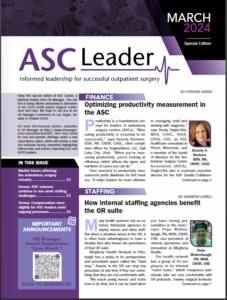
 Blog Post 2019 Planning Committee Update
Blog Post 2019 Planning Committee Update
Amazing how fast the year has gone. It feels like I just finished the blog to say, “welcome,” and now I am taking a moment to wish you all a very happy holiday season. And now, more than ever, this blog is meant for all ambulatory surgery center leaders (whether…
Orthopedic experts urge caution when starting total knee service lines
Total joint replacements contribute hefty profits to hospitals and healthcare systems. Once the Centers for Medicare & Medicaid Services (CMS) starts reimbursing surgery centers—as is done for hospital outpatient surgery departments (HOPDs)—the competition between hospitals, HOPDs, and ambulatory surgery centers (ASCs) will intensify. “Total joints are the hot ticket in…
 Subscriber Content Advise and collect: Helping patients pay for surgery
Subscriber Content Advise and collect: Helping patients pay for surgery
Long gone are the days when employer-based health insurance covered most, if not all, of patients’ healthcare bills. Insurance companies and employers expect individuals to pay a larger chunk of healthcare costs themselves. The 2018 benchmark Kaiser Family Foundation (KFF) Employer Health Benefits Survey found that “a quarter (26%) of…
 Blog Post The ASC Safety Officer Role – Who, what, why, and how?
Blog Post The ASC Safety Officer Role – Who, what, why, and how?
The safety officer plays an important role in helping a healthcare facility maintain a safe environment for patients, staff, and visitors. The person in this role should complement the safety plan in helping to reduce risk. Responsibilities of the safety officer include assisting in staff safety education, monitoring the environment,…
 Subscriber Content Early action advised to achieve better OAS CAHPS responses
Subscriber Content Early action advised to achieve better OAS CAHPS responses
Mandatory implementation of the Consumer Assessment of Healthcare Providers and Systems Outpatient and Ambulatory Surgery Survey (OAS CAHPS) originally scheduled for 2018 has been delayed, but that does not mean it should be ignored, say ambulatory surgery center (ASC) leaders. The earliest projected date when the survey could become mandatory…
 Blog Post Numbers aren’t always the answer: What can you learn from your frontline staff?
Blog Post Numbers aren’t always the answer: What can you learn from your frontline staff?
We have all heard the safety instructions prior to takeoff: Put on your own oxygen mask first, before helping others around you. However, as nurses and caregivers, we are often so busy helping those around us that we don’t even think about applying our own “oxygen mask,” or what the…
ASC leaders' satisfaction dips as salaries increase slightly
Leaders of ambulatory surgery centers (ASCs) are less satisfied than they were a year ago, according to the OR Manager 2018 Salary/Career Survey. In 2017, 83% were satisfied with their current job or position, compared with 77% this year. Other areas where satisfaction dipped by five percentage points or more…
 Subscriber Content What are the top challenges for today's ASC leaders?
Subscriber Content What are the top challenges for today's ASC leaders?
We asked some top ambulatory surgery center (ASC) leaders, including members of OR Manager’s Editorial Advisory Board, to identify the top challenges ASC leaders are facing. Here are their responses. We believe you will see some of your own challenges reflected in their comments. Mary Stewart, MSN, BSN, RN…
 Blog Post Would You Be Scoped in Your Own Facility? Tips and Tricks to Endoscope Reprocessing
Blog Post Would You Be Scoped in Your Own Facility? Tips and Tricks to Endoscope Reprocessing
Would You Be Scoped in Your Own Facility? Tips and Tricks to Endoscope Reprocessing by Nancy Schlossberg, BSN, RN, CGRN, CER, Program Director-Digestive Health Services, John Muir Health New guidelines from the American Cancer Society recommend that colorectal cancer screening begin at a younger age than what is currently…
 Blog Post Are Your Hands Clean? - Exploring the Importance of Hand Hygiene in ASCs
Blog Post Are Your Hands Clean? - Exploring the Importance of Hand Hygiene in ASCs
Are Your Hands Clean? - Exploring the Importance of Hand Hygiene in ASCs by Donna Label, MSN, RN, NEA-BC, CNOR, Consultant Taylor, thank you so much for asking me to do this post for the new ASC blog with OR Manger. As this is my first entry, I felt…


